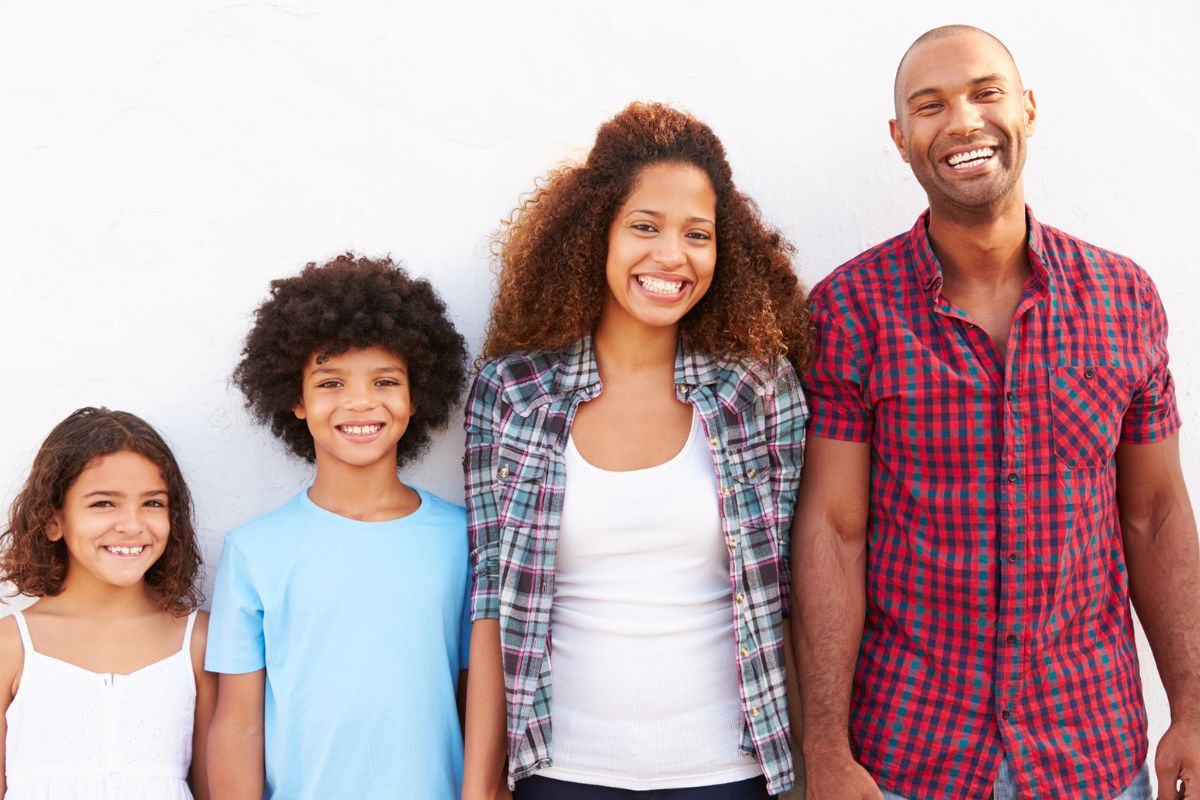Adoption Stories: 4 Unique Stories Plus FAQ
Adoption creates possibility. It doesn’t mean a child will have a perfect future, but it allows a child to have a future. This can make all the difference.
According to the Adoption Network, about 135,000 children are adopted in the United States each year (1).
That’s 135,000 children embracing opportunities they may not have been able to otherwise.
With about 7 million total adoptees in the U.S., there are stories of adoption all around us. Many of them are heartwarming, while a few are heartbreaking (1).
Most of them run the gamut of emotions as a family experiences deep joy following tragedy and pain.

Pregnancy options overwhelming?
Book a visit at the Pregnancy Resource Center for advice & support.
Every adoption story is different, as every human is unique. Some children want to know about their birth families; some do not.
A few may want to maintain ties to the ethnic or cultural background of their biological parents. Others would rather live according to the culture they’re raised in.
Some youth experience behavioral and mental health challenges. Most go through the same challenges any adolescent faces.
Navigating the adoption process is not easy.
We’ve included adoption stories along with answers to questions about adoption. We hope these resources help you on your journey.
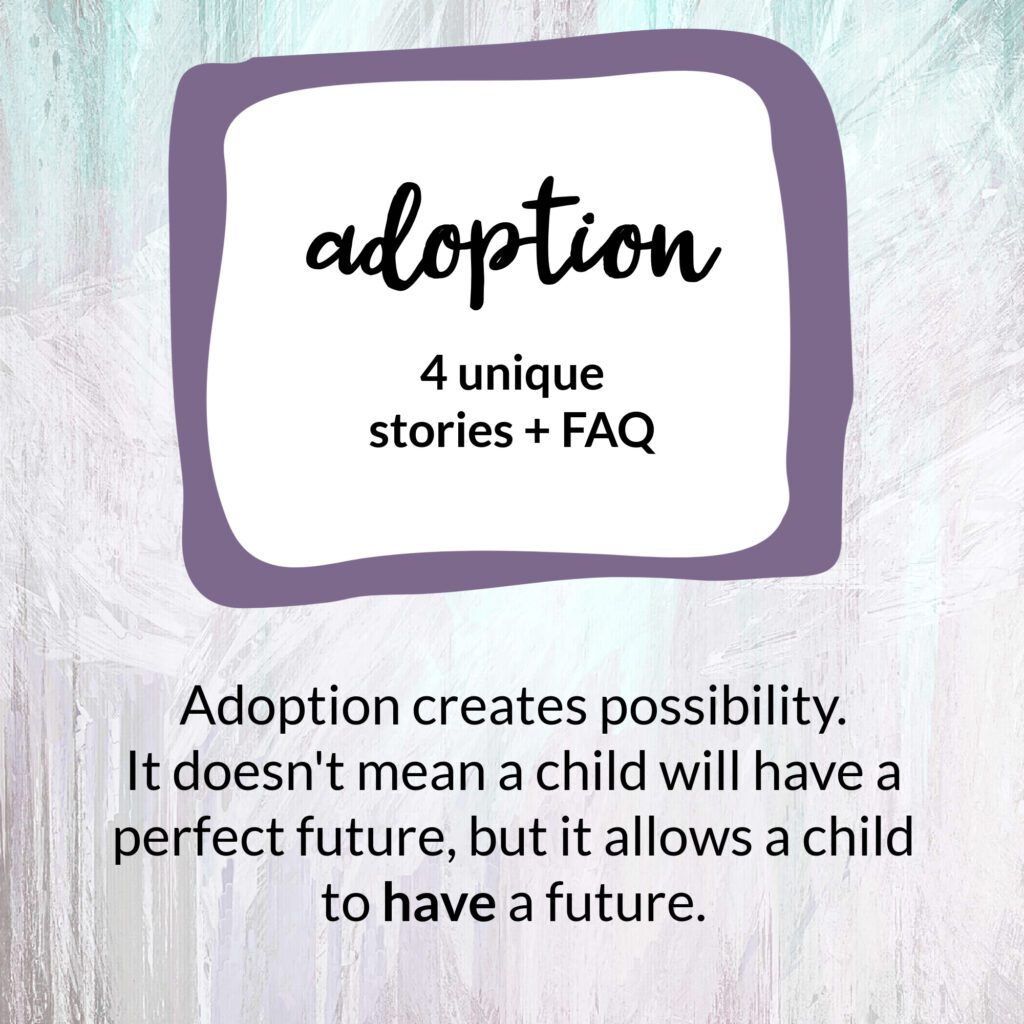
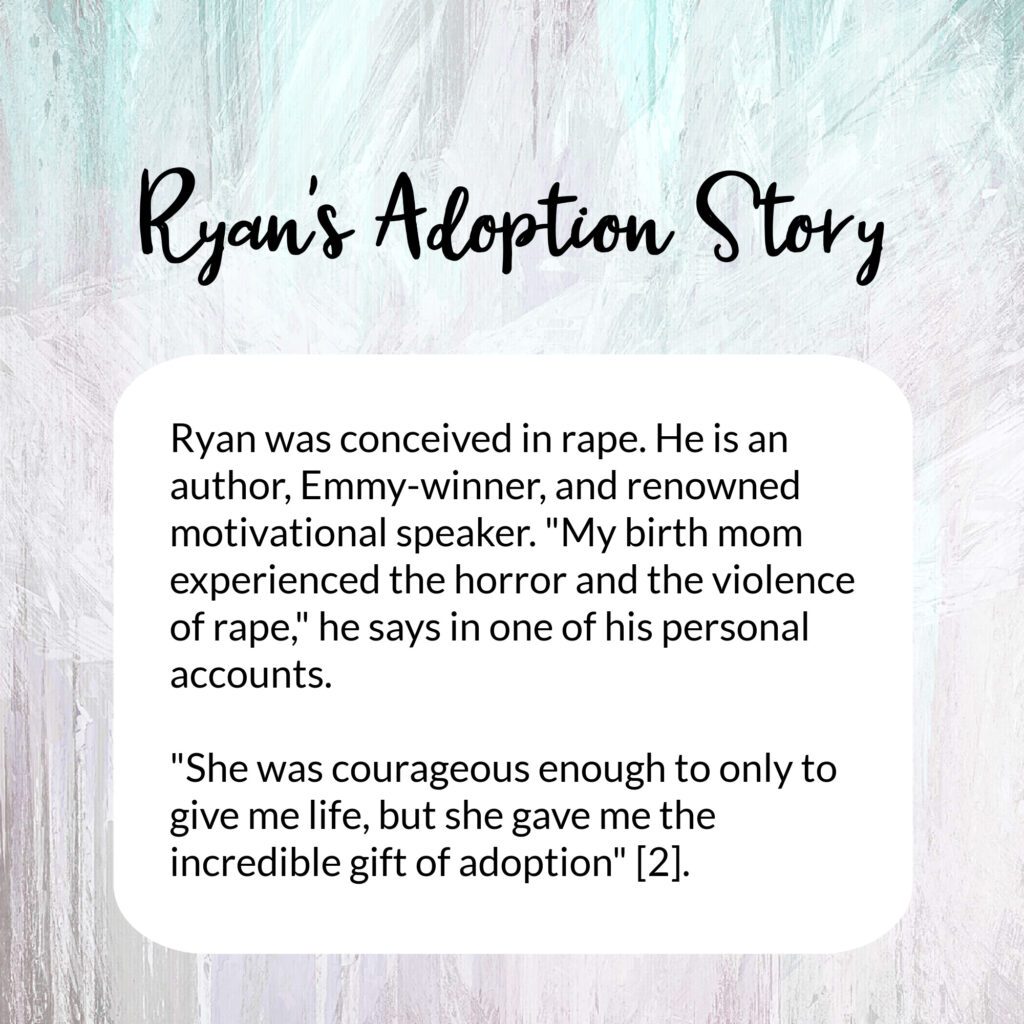
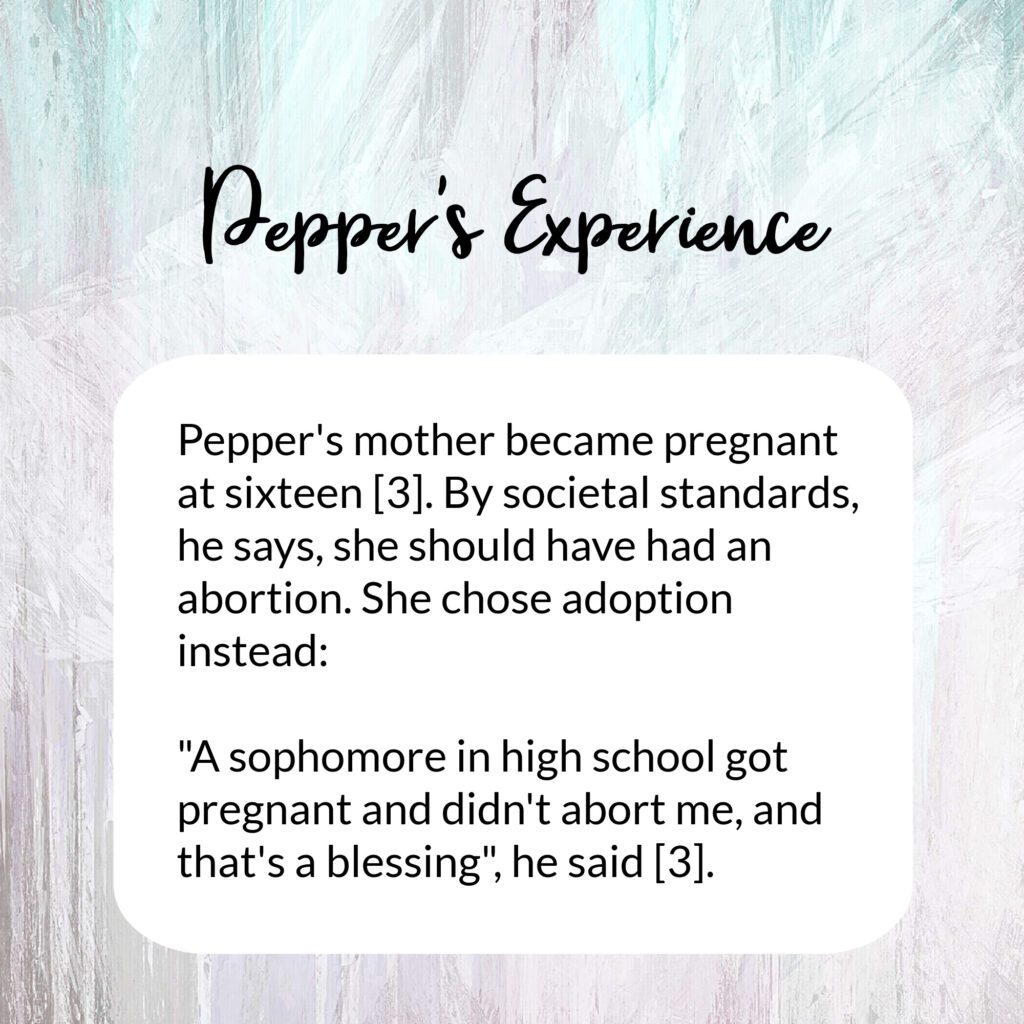
Ryan’s Adoption Story
Consider the story of Ryan Bomberger. He was adopted at six weeks old, the first of ten children his parents would adopt. Ryan was conceived in rape.
He is now an author, Emmy-winner, and renowned motivational speaker. Ryan serves as a living example of the potential that a child has even when born from the worst circumstances [2].
“My birth mom experienced the horror and the violence of rape,” he says in one of his personal accounts. “She was courageous enough not only to give me life, but she gave me the incredible gift of adoption” [2].
Ryan and his wife Bethany head The Radiance Foundation. This nonprofit promotes adoption and other causes related to human dignity and equality.
Together they have continued his parents’ legacy of hope. They adopted two children and help pregnancy-related nonprofits raise funds [2].
Pepper’s Experience
Another valuable personal story comes from Pepper. His mother became pregnant at sixteen [3]. By common societal standards, he says, she should have had an abortion.
She chose adoption instead: “A sophomore in high school got pregnant and didn’t abort me, and that’s a blessing,” he said [3].
Pepper’s mother attended a Christian concert that included a plug for adoption at the end. Afterward, she spoke to the musician for more information.
Through that connection, she met the couple who would become his adoptive parents.
The two maintained a relationship with her over the years and allowed her to have a connection with her child [3].
The Open Adoption option
“I don’t remember finding out that I had biological parents,” he says now. “I remember finding out that other kids didn’t have [bonus] parents!” [3].
Pepper’s birth mother and adoptive family opted for an “open adoption.”
This is a relationship in which biological parents keep in contact with the child and his or her new family.
About 60-70% of adoptions in the U.S. follow this popular model [1].
The level of contact varies with each case. But knowledge of the child’s growth helps birth parents heal from the feeling of loss they may experience [4].
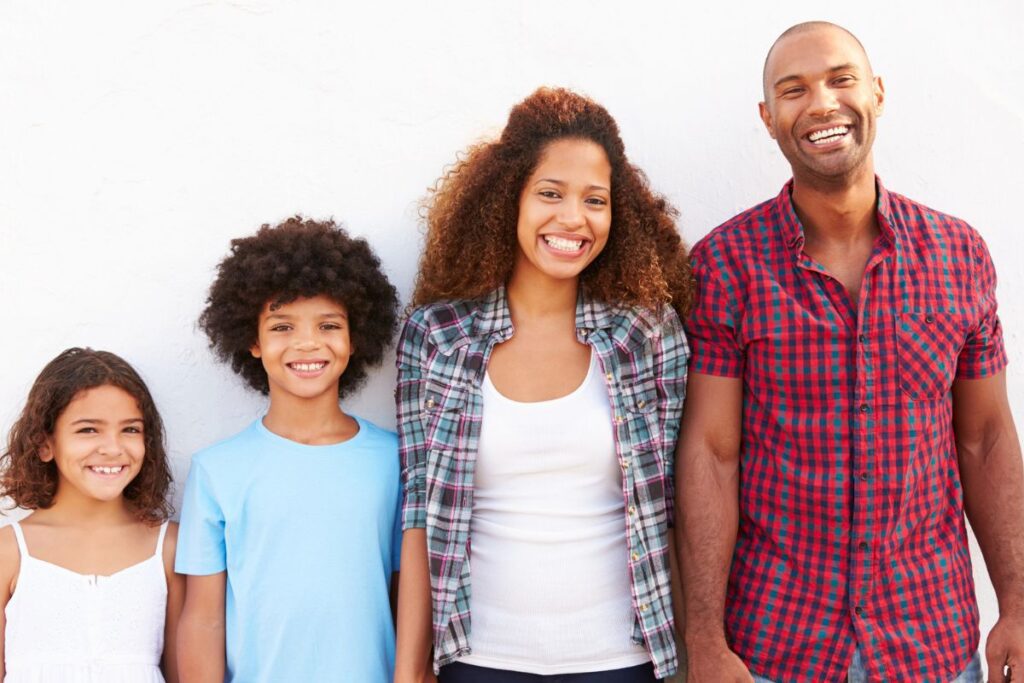
Have Adoption Questions?
Contact the Pregnancy Resource Center of Mountain Grove to discuss more information.
For Pepper and his adopted siblings, this was normal. They did not lack any connection in their day-to-day lives.
However, growing up with knowledge about them meant they didn’t have to wonder. Their parents were always ready to help answer any questions or to call their birth families to sate their curiosity [3].
Today, Pepper says that he feels a strong connection to his biological half-sibling. He also had special relationships with his grandparents and extended family growing up [3].
Pepper’s family’s approach might not apply to every adoption situation.
Their story shows how open adoption can keep family ties alive for decades to come.
Adoption Challenges: Patrick’s Story
Of course, that’s not to say that adoptees don’t face challenges.
In a blog post for Psychology Today, specialist and adoptee Patrick Burns writes about the risks adopted children face. These include behavioral and psychological difficulties [5].
He also points out that these increased risks are still within a normal range.
Often adopted children are diagnosed more frequently. This is because adoptive parents tend to seek out all available help for their children [5].
Patrick goes into a few details of his own experiences as a teenager on his blog.
These experiences included low grades in school, drugs, and conflict with his family. All are problems that many adolescents face, adopted or not [5].
“For quite some time now, I have exhibited little evidence of ‘problem behaviors,'” he says. “I am sober, have completed a B.A. and an M.A., have found fulfilling work, own a house, am in a meaningful relationship, and enjoy a special connection with my mom and dad” [5].
His story is common. It demonstrates that even if an adoptee encounters challenges growing up, they can overcome them.
Adoption can provide relationships that help empower children.
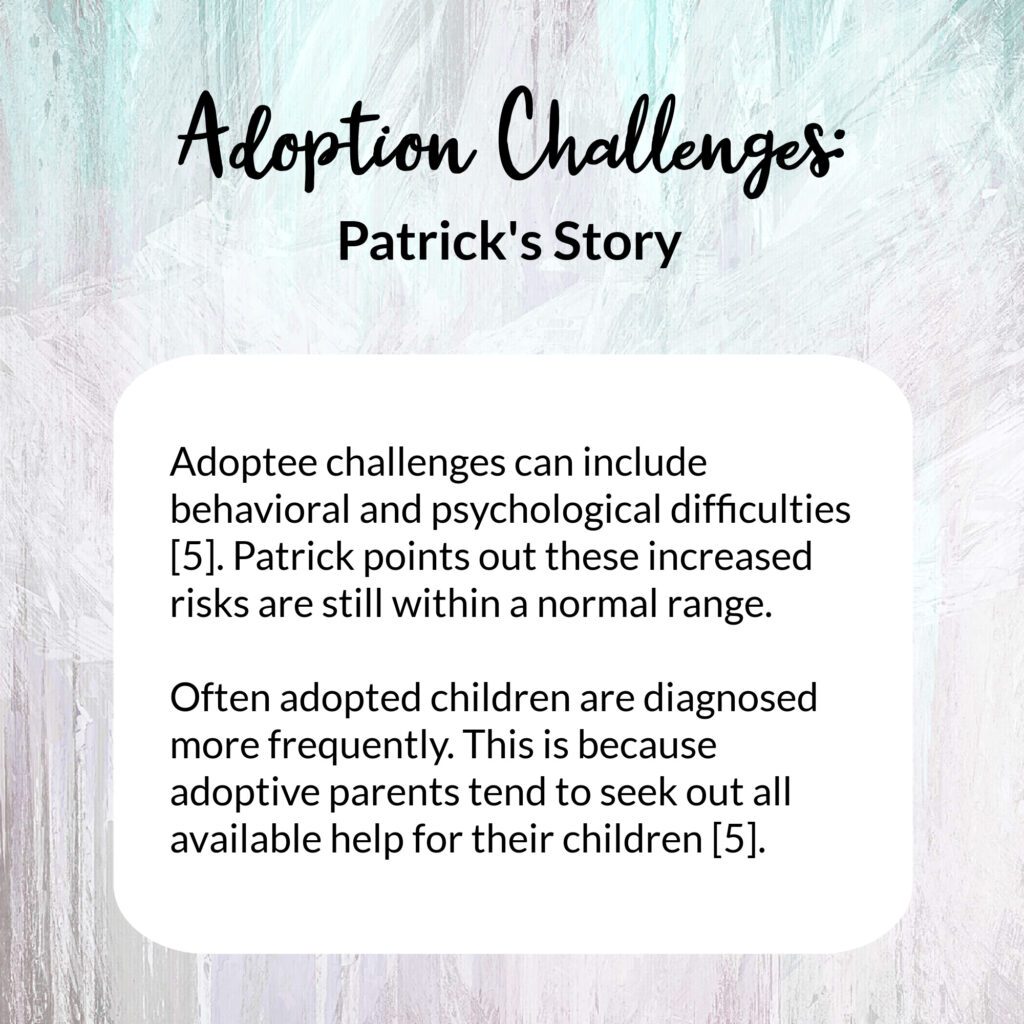
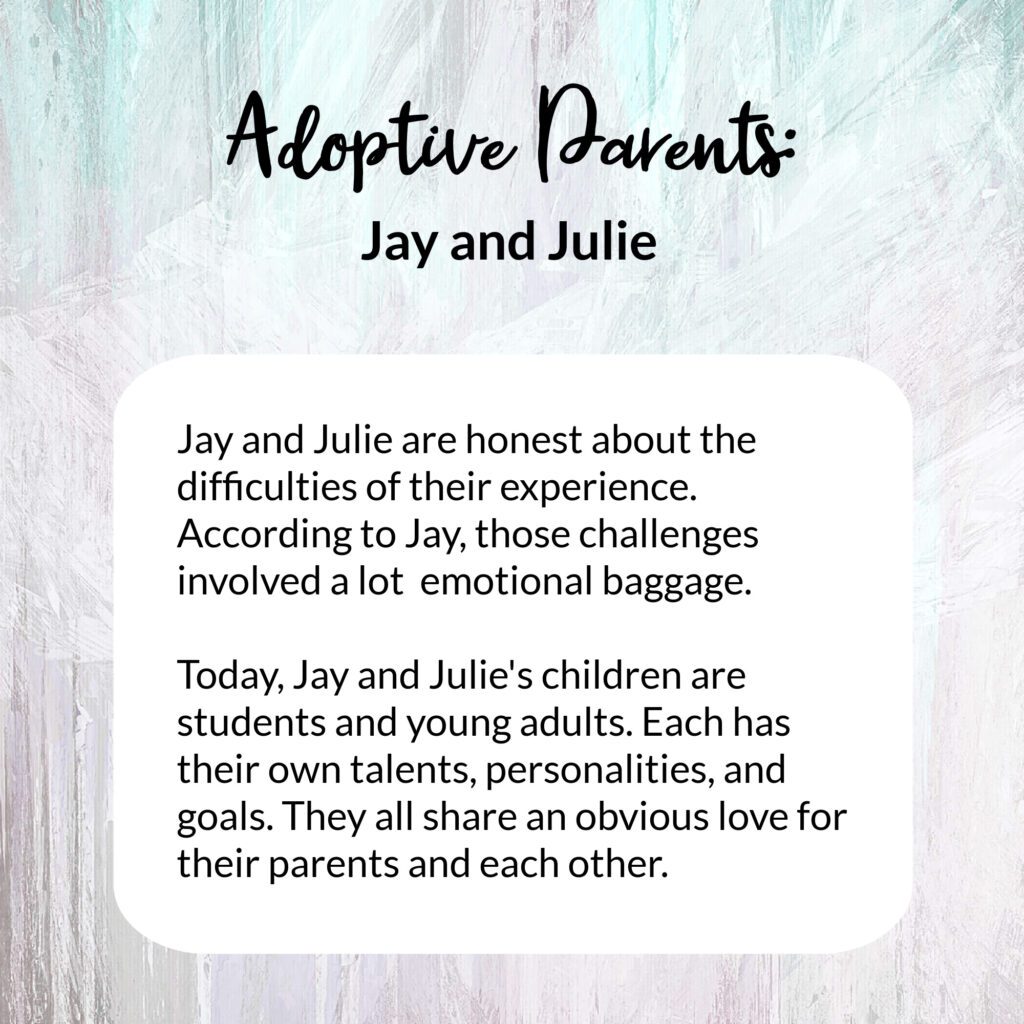
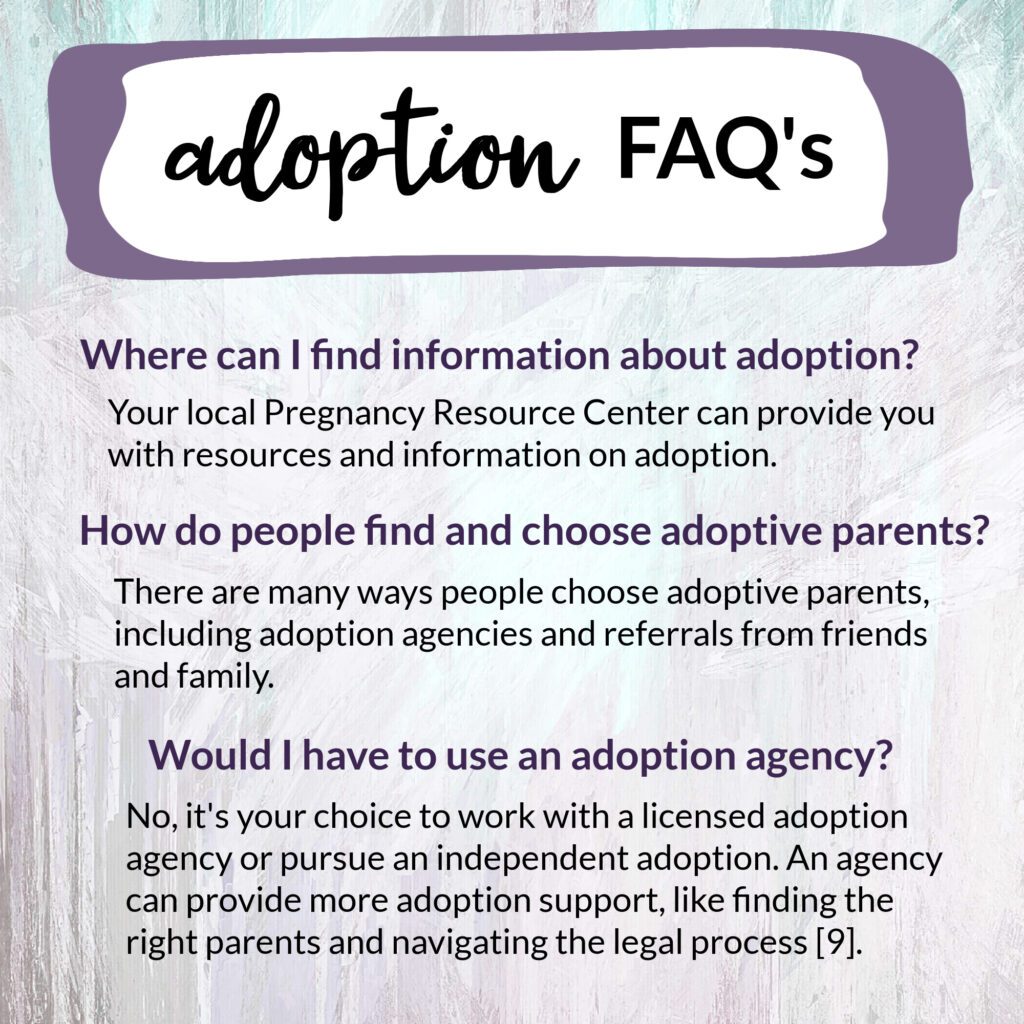
Adoptive Parents: Jay and Julie
Adoptees aren’t the only ones whose lives change for the better in adoption.
It makes a world of difference to adoptive parents too. One couple, Jay and Julie fostered and adopted a pair of half-siblings, and then a baby a few years later [6].
Jay and Julie are honest about the difficulties of their experience. Jay shares that they “went in with rose-colored glasses and realized there were challenges you couldn’t foresee. But those challenges were good” [6].
According to Jay, those challenges involved a lot of emotional baggage. But the bonds the family formed were worth all the effort.
“It was just obvious to a parent in the way that they joined up in our family that they were looking forward to it, to have brothers and sisters and a mom and dad.” In simple terms, “They loved having a family!”[6].
Today, Jay and Julie’s children are students and young adults. Each has their own talents, personalities, and goals.
They all share an obvious love for their parents and each other.
Any hardships accompanying the adoption process only strengthened the bond their family shares. “It was a challenge,” Jay says, “but it was not one that we would trade. We love our kids” [5].

Struggling with adoption process?
We can connect you with the resources you’re looking for.
What all adoption stories share
No two adoption stories are the same, but there are a few things they have in common.
In most cases, a birth mother chooses to let someone else raise her child. Others decide to raise that child as their own.
In all cases, this involves challenges, which adoptees and families face together.
Adoption doesn’t mean a perfect life, nor does it mean a life of stigma and loss.
But adoption does mean life, and where there’s life, there’s hope.
Adoption FAQs
Where Can I Find Information About Adoption?
If you are facing an unplanned pregnancy, or would like more information, the Pregnancy Resource Center of Mountain Grove can connect you with more resources.
Most adoption centers have their own websites and social media pages.
These provide specifics like open hours, privacy policies, and terms of service. The staff at the Pregnancy Resource Center are also happy to help you find out what you need to know.
How Do People Find And Choose Adoptive Parents
There are many avenues birth parents can use to find the right permanent family for their baby. This includes adoption agencies, mutual friends and family, and other sources.
Finding the right fit varies in length depending on the individual situation.
Many agencies allow a birth mother to specify details about the family she’d like her baby to go to. These specifications may include age, ethnicity, sexual orientation, or religious background [8].
Would I Have to Use an Adoption Agency?
No, it is your choice to work with a licensed adoption agency or pursue an independent adoption.
An agency is usually able to offer more adoption support, like finding the right parents and navigating the legal process [9]
Many adoption agencies also offer free counseling even after the baby is born (sometimes for years into the future).
How Do I Know An Adoptive Home Will Be Safe?
Anyone seeking an adoption in the U.S. must complete a home study and pass a background check to qualify [10].
Specific requirements can differ according to state adoption laws.
Public and private agencies may have their own methods for conducting home studies.
But all share the common goal of ensuring every adopted child receives a safe, loving home [10].
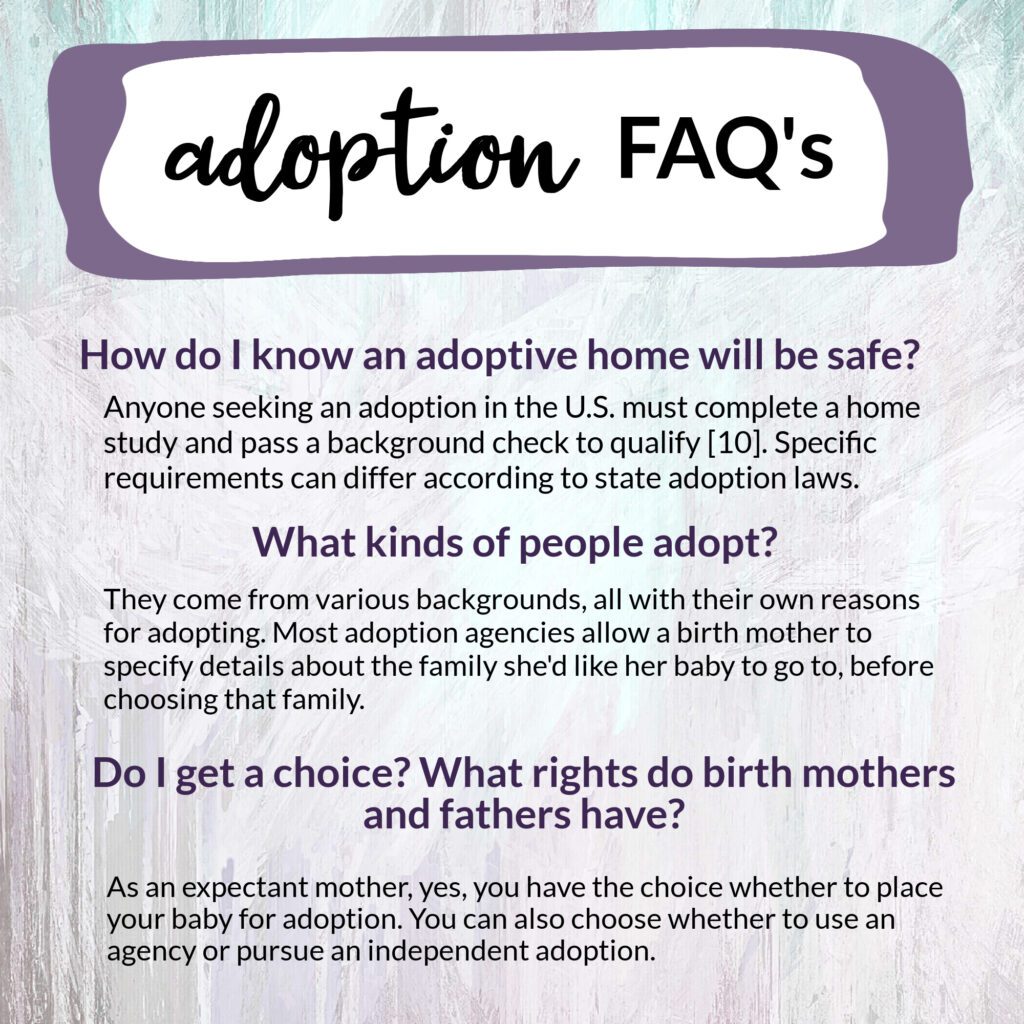
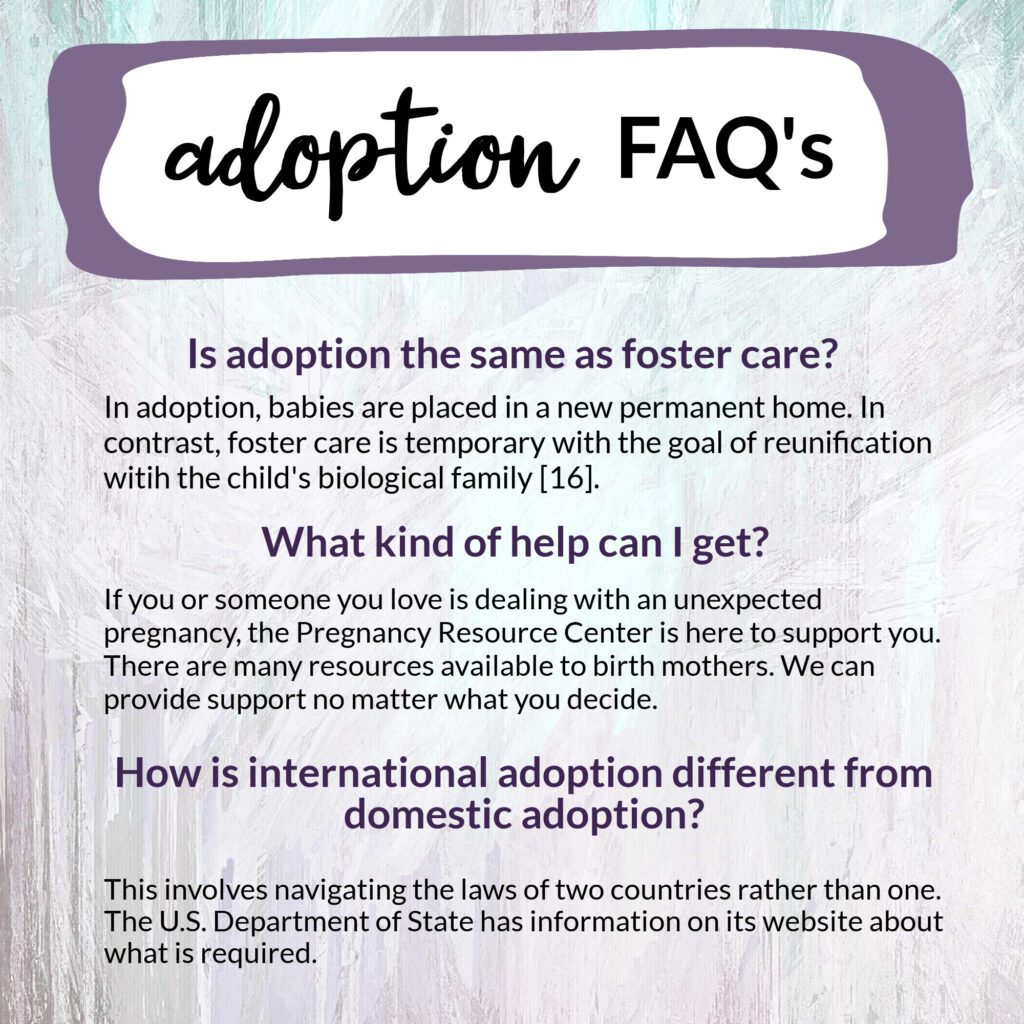
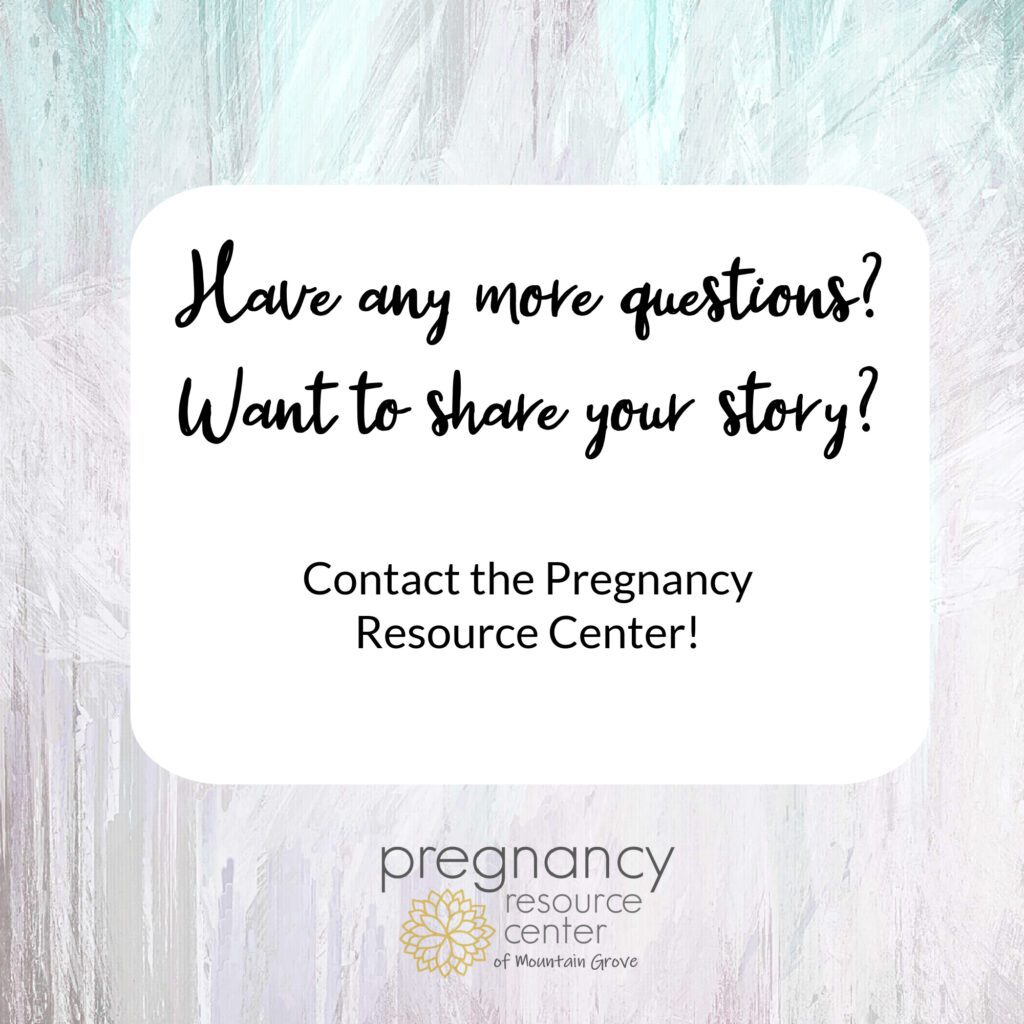
What kinds of people adopt?
As America has become more diverse, so have adoptive families [11].
They come from various backgrounds, all with their own reasons for adopting. Some couples adopt due to infertility. Others seek to adopt after having biological children.
Transracial adoption is common, as are both non-religious and Christian adoptions. Most prospective adoptive parents are married or in a domestic partnership.
Some single people form a loving family through adoption [12]. While the motivations and the kinds of people differ, most genuinely desire to show a child unconditional love.
How is international adoption different from domestic adoption?
Many prospective parents choose intercountry adoption. This involves navigating the laws of two countries rather than one. U.S. citizens adopting from abroad must obtain citizenship for their adopted child.
The U.S. Department of State has information on its website about what is required. Many agencies and attorneys specialize in international adoptions [13].
What rights do birth mothers and birth fathers have?
Your rights as a birth mother seeking adoption vary depending on where you live. You can choose adoption at any time before or after birth.
Generally, you can change your mind until the adoption takes place [14]. A birth father’s rights also differ by state (15).
Do I get a choice?
If you are an expectant mother, yes, you have the choice whether to place your baby for adoption.
You can also choose whether to use an agency or pursue an independent adoption.
If your child is currently in foster care, you still have agency. In some cases, you may choose to surrender your parental rights.
This can happen if you believe your child is in a safe home and adoption is the best option. In most states, the foster care system makes every effort to reunify children with their biological parents [17].
Foster care adoptions only occur after a termination of parental rights. This usually takes months of reunification services and many review hearings. The court will also consider other family members who express a willingness to adopt.
What kind of help can I get?
If you or someone you love is dealing with an unplanned pregnancy, the Pregnancy Resource Center of Mountain Grove is here to support you.
There are many, many resources available to birth mothers. This includes support groups, financial assistance and more [16].
The Pregnancy Resource Center can help connect you with these resources to ensure the well-being of both you and your child.
Hit the chat button on your screen to find out more.
Read next:
What is the difference between closed and open adoption?
Pregnant and Unemployed? 7 Great Options for Missouri Women
What to Expect at your first visit to the Pregnancy Resource Center
SOURCES:
- US Adoption Statistics. Adoption Network. https://adoptionnetwork.com/adoption-myths-facts/domestic-us-statistics/
- Bomberger, Ryan. Fun. Bold. Creative. Fearless. Ryan Bomberger. The Radiance Foundation. https://www.theradiancefoundation.org/ryan/
- Jensen, Pepper. (2021, December 11). Personal interview.
- Henney, Susan. (2007, December 1). Evolution and resolution: Birthmothers’ experience of grief and loss at different levels of adoption openness. Journal of Social and Personal Relationships, 24(6). https://journals.sagepub.com/doi/abs/10.1177/0265407507084188
- Burns, Patrick. (2015, March 31). The Adjustment of Adoptees: Studying the behavior and adjustment of adopted children. Psychology Today (The Guest Room). https://www.psychologytoday.com/us/blog/the-guest-room/201503/the-adjustment-adoptees.
- Jay and Julie Underwood. Personal interview, December 10, 2021.
- How to Find Birthmothers for Adoption Using Social Media. America Adopts! https://americaadopts.com/find-birthmothers-adoption-using-social-media/
- Waiting Families. Considering Adoption. https://consideringadoption.com/pregnant/finding-a-family/waiting-families/
- Private vs. Agency Adoption. My Adoption Advisor. https://myadoptionadvisor.com/adoption-articles/private-vs-agency-adoption/
- The Adoption Home Study Process. Pamphlet. Child Welfare Information Gateway. https://www.childwelfare.gov/pubPDFs/f_homstu.pdf
- What You Need to Know About the History of Adoption. American Adoptions. https://www.americanadoptions.com/adoption/history-of-adoption
- What Types of People Adopt? [The Perfect Family Is Waiting]: How an Adoption Agency Can Help You Find an Adoptive Family. Considering Adoption. https://consideringadoption.com/pregnant/finding-a-family/what-types-of-people-adopt/
- Adoption. U.S. Citizen and Immigration Services website. https://www.uscis.gov/adoption
- “When Can You ‘Give a Child Up’ for Adoption? [Is It Too Late?]”. Considering Adoption. https://consideringadoption.com/pregnant/when-can-you-choose-adoption/when-can-you-give-a-child-up-for-adoption/
- Birth Father Rights, the Putative Father Registry and Adoption: How You Can Help Create a Better Future for Your Child. Considering Adoption. https://consideringadoption.com/pregnant/father-of-the-baby/if-you-are-a-birth-father-putative-father-registry/
- Bolin, Leslie. (2019, October 29). Birth Mother Support Groups. Adoption.com. https://adoption.com/birth-mother-support-groups
- (2021, May 14). Child Welfare Outcomes 2018: Report to Congress. Children’s Bureau. https://www.acf.hhs.gov/cb/report/cwo-2018
- Child Welfare Outcomes Report Data. Children’s Bureau. https://cwoutcomes.acf.hhs.gov/cwodatasite/

